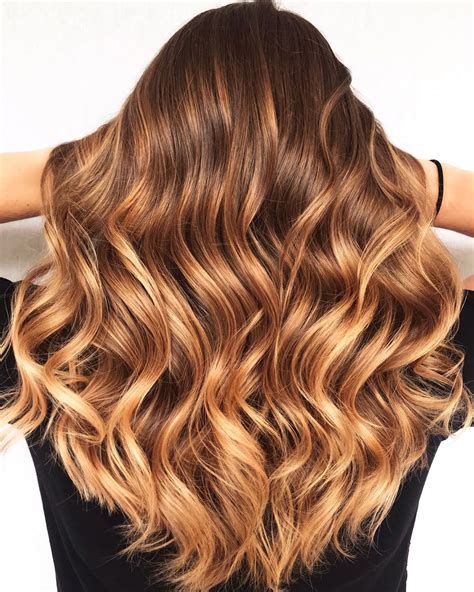Balayage Hair: A Caramel-Colored Revolution
Balayage, a French hair coloring technique, has swept the industry by storm, transforming locks with subtle, sun-kissed hues. Caramel balayage, in particular, has become a coveted shade, adding warmth and dimension to hair of all textures.

Caramel Balayage: A Golden Opportunity
According to the National Hairdressers Federation, caramel balayage is the most requested hair color in salons today. Its popularity stems from its versatility, flattering a wide range of skin tones and complementing both warm and cool undertones.
Caramel balayage is achieved by hand-painting highlights onto the hair, creating a soft, blended effect. The technique mimics the natural lightening that occurs from sun exposure, resulting in a seamless transition from darker roots to lighter ends.
Why Caramel Balayage Matters
- Enhances Complexion: Caramel balayage frames the face, accentuating natural features and creating a more youthful appearance.
- Adds Dimension and Volume: The contrasting shades add depth to hair, making it appear thicker and more voluminous.
- Low Maintenance: Unlike traditional highlights, caramel balayage requires less frequent touch-ups, as the color grows out more subtly.
- Versatile Style: Caramel balayage can be styled in various ways, from loose waves to sleek ponytails, showcasing its versatility.
Benefits of Caramel Balayage
- Sun-Kissed Glow: Creates a warm, radiant aura that enhances natural beauty.
- Versatile Color: Complements different skin tones and hair hues, making it a universally flattering choice.
- Low Damage: Hand-painting minimizes hair damage, preserving the hair’s integrity.
- Easy Maintenance: Requires less frequent touch-ups compared to traditional highlights.
Common Mistakes to Avoid
- Over-Processing: Too much bleach can damage hair and result in brassiness.
- Uneven Application: Improper hand-painting can lead to inconsistent color distribution.
- Wrong Shade: Choosing a caramel shade that doesn’t complement the skin tone can create an unflattering contrast.
- Too Much Color: Excessive caramel highlights can overwhelm natural hair color and appear artificial.
Tips for a Flawless Caramel Balayage
- Consult a Professional: Seek a skilled hair colorist experienced in balayage techniques.
- Choose the Right Shade: Consider skin tone, eye color, and natural hair color when selecting a caramel shade.
- Protect Hair: Use heat protectant spray before styling to minimize heat damage.
- Deep Condition Regularly: Nourish hair with deep conditioning treatments to maintain hair health and vibrancy.
Caramel Balayage Techniques
Traditional Balayage
- Hand-painting highlights onto the hair, creating a soft, diffused effect.
Reverse Balayage
- Painting darker tones onto lighter hair to create a more dramatic, ombré effect.
Ombre Balayage
- Combining balayage and ombré techniques, resulting in a gradual transition from dark roots to light tips.
Foilyage
- Using foil to isolate sections of hair and apply highlights, creating bolder, more defined contrasts.
Caramel Balayage for Different Hair Types
- Fine Hair: Caramel balayage adds volume and movement, creating the illusion of thicker hair.
- Medium Hair: Balayage adds dimension and texture, enhancing movement and style options.
- Thick Hair: Caramel highlights break up thick locks, reducing bulk and creating a lighter feel.
- Curly Hair: Caramel balayage can define curls, enhancing their natural beauty and reducing frizz.
4 Useful Tables
| Caramel Balayage Benefits |
|—|—|
| Enhances complexion |
| Adds dimension and volume |
| Low maintenance |
| Versatile style |
| Common Mistakes to Avoid |
|—|—|
| Over-processing |
| Uneven application |
| Wrong shade |
| Too much color |
| Caramel Balayage Techniques |
|—|—|
| Traditional Balayage |
| Reverse Balayage |
| Ombre Balayage |
| Foilyage |
| Caramel Balayage for Different Hair Types |
|—|—|
| Fine Hair |
| Medium Hair |
| Thick Hair |
| Curly Hair |
FAQs
Q: Can caramel balayage damage my hair?
A: When performed by a skilled professional, caramel balayage uses minimal bleach and hand-painting techniques, minimizing hair damage.
Q: How often do I need to touch up my caramel balayage?
A: Depending on hair growth rate, touch-ups are typically recommended every 3-6 months.
Q: Is caramel balayage suitable for all skin tones?
A: Yes, caramel balayage complements different skin tones, from fair to dark.
Q: How long does caramel balayage take?
A: The duration varies depending on hair length and desired effect, but typically takes several hours.
Q: Can I achieve caramel balayage at home?
A: While possible, it is highly recommended to seek professional services to ensure precision and avoid potential damage.
